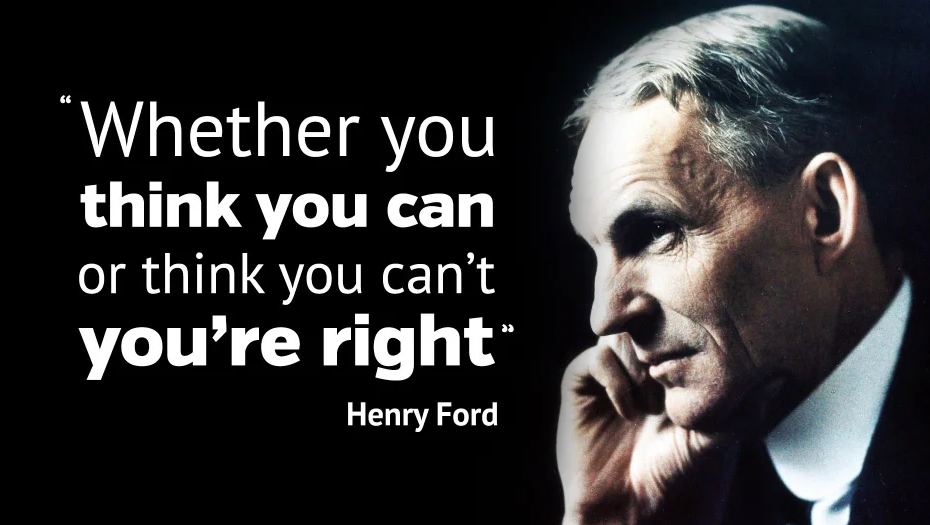Before You Read
- Put on some music. I’ll tell you why later.
- Ask yourself, “How do I see new challenges.?”
What are Fixed and Growth Mindsets?
The concept of growth and fixed mindset is the main achievement of Professor Carol Dweck. However, I like to go way back to Henry ford who said:


I think that is exactly what Dweck’s research has shown. So, just what are these two mindsets and how do we get them?
Well, a fixed mindset arises when you develop, over time, a belief deep in yourself that you have certain abilities and you can do great things with them because people like your parents and teachers keep telling you. They say things like, “Well done, aren’t you clever?”
Now, what that builds up in you is a belief that in order to succeed at something you need that particular “clever”, knack, or ability. The problem is that when you encounter something that you can’t do initially, you give up because a little voice inside is telling you that there is no point in trying.
OK, that’s not great, but what about the other mindset—the growth one?
The name itself sounds positive. Growth mindsets are encouraged when people praise you for the effort you have made and for not giving up. They say things like, “Well done, you kept at that until you got it.”
Unlike their “fixed” buddies, a “growth” person doesn’t give up when they come across something they can’t do Initially. They keep going, and trying with what Dweck calls a “not yet” approach. They build a “can do” mentality that enables them to succeed where fixed mindset people give up.
Is It Too Late For Me to Develop a Growth Mindset?
No!
Oh, you want more?
If you read between the lines of the research, you will quickly come to the conclusion that success is built on self-belief. That self-belief can be installed in you when you are young by parents, teachers, and your own self-discovery.
However, you can also change your own self-belief to a more positive one by changing your attitude to failure. This is circling back to the idea that fixed mindsets give up and growth mindsets keep trying.
We all know that old adage, “We learn from our mistakes.” Failure is an essential part of learning. Do you think that Andy Murray won every match as a child or mastered every stroke instantly? Or do chess grand masters pop out of the womb with the genetic ability to always win?
Look at Edison, did he have a “light bulb” moment when inventing the light bulb? In actual fact he failed constantly, but learned from each failure. As he said himself, “I have not failed. I have just found 10,000 ways that won’t work.” I’m pretty sure he had a growth mindset.
What you need to do to get into that positive self-image, is a lot of self-talking and analysis. I always say that learning has more to do with emotions than thinking. Every time you embark on a new learning experience both the process and the outcome will affect your feelings. These can be temporary effects or reinforcing deep-seated self-beliefs.
How Feelings Affect Our Learning
Let’s start with the outcome. If, at the end of a period of study, you have grasped the topic and are skipping and whistling down the road to mastery, then you will have feelings of satisfaction, joy, and contentment. Inside, in your deeper subconscious, you will have the positive urge to repeat this process so that your brain gets another reward.
It’s like when you teach a dog a new trick; you reward it with a treat. Our treats are these positive feelings.
On the other hand, if you are still struggling with the concepts, you will probably be feeling depressed, anxious, and angry. Few people actually get anything out of inflicting pain on themselves. Consequently, to avoid these painful emotions, you will go into avoidance mode and find excuses to do something else when you should be learning.
That’s stating what is relatively obvious to most people. However, emotions are actually a critical part of the learning process. Research into this underlines just how much emotion plays a part in supporting our learning.
The simplest way to illustrate this is to look at the old-fashioned notion that emotions were to learning what an unruly child is to a china shop. The child runs around knocking things over and preventing the smooth running of the shop.
Now, however, emotions are seen as the shelves supporting the china. Positive emotions improve cognition, focus, and the encoding of information into long-term memory (LTM).
Can you remember the last time a teacher or other educator asked you how you were feeling as you were trying to learn something?
Growth Mindset and Feelings
So, let’s finish off by considering what is going to help you learn.
- Develop a positive attitude to yourself. Keep reinforcing the “think you can” attitude.
- Notice your emotions and deal with them.
- Listen to music as you learn. Music helps improve your mood and gets those positive emotions a head start. That’s why I asked you to put on some music before reading this.
Of course, there is much, much more to learning than this. Which is why this is just one of a series of articles we are publishing on learning.
At the beginning, I requested that you ask yourself a question. The reason I did that was to prime your brain for taking in information. More on that in a later article.

